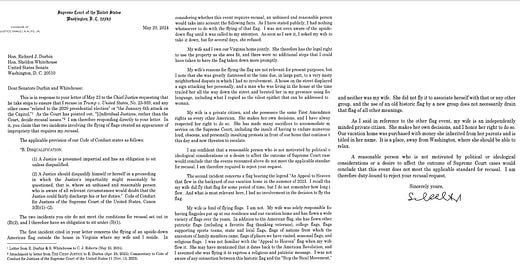Alito Applies the New Supreme Court Ethics Code to His Wife's Flags - LER Bonus Content No. 12 (05.29.24)
I read the Alito letters and related commentary so you don't have to - get the highlights in this Legal Ethics Roundup bonus content post.
“My wife is fond of flying flags. I am not.” — United States Supreme Court Justice Samuel Alito
Welcome to your twelfth installment of bonus content from the Legal Ethics Roundup!
In addition to the (FREE!) weekly roundup every Monday morning, I regularly post bonus content for paid subscribers. This material offers a deeper-dive into issues touched upon in the weekly roundup and sometimes covers breaking news that can’t wait until Monday, like this week! (If you need a comp paid subscription to read this full bonus content post, let me know at legalethics@substack.com - no questions asked. Otherwise, thank you for reading and supporting this work!)
As I predicted in an interview last year with Adam Liptak (NYT), the ethics code adopted by the United States Supreme Court has proven to be toothless at best. Even worse, the code seems to be emboldening choices that would not withstand scrutiny if made by judges whose recusal decisions are subject to review or appeal, a consequence I am now fully appreciating.
From PBS earlier today: “In letters to members of Congress on Wednesday, Justice Samuel Alito rejected calls to step aside from Supreme Court cases involving former President Donald Trump and Jan. 6 defendants because of the controversy over flags that flew over his homes. Alito said his wife was responsible for flying an upside-down American flag over his home in 2021 and an ‘Appeal to Heaven’ flag at his New Jersey beach house last year. Neither incident merits his recusal, he wrote.” Read more here.
There are actually two letters - you can read them here and here, courtesy of PBS. Perhaps even more important than what Alito says about his decision not to recuse in cases involving January 6 or the 2020 election is the commentary this has generated.
My focus, as a judicial ethics scholar, is on whether recusal is required. It is not under the Supreme Court’s current ethics code, as I explained to CNN reporter John Fritze. If that conclusion sparks outrage, it should be focused on the code itself, not simply Alito’s application of it, in my view. And the code is deeply flawed because it lacks no mechanism for impartial review. The decision of judicial recusal or disqualification should be subject to some sort of independent scrutiny, whether among the other justices themselves or an inspector general/SCOTUS ethics lawyer (see, e.g., this proposal from former White House ethics lawyer for George W. Bush and now law professor Richard Painter).
Representative Jamie Raskin (D-Maryland) also offered a solution in an op-ed published by the New York Times today: “Everyone assumes that nothing can be done about the recusal situation because the highest court in the land has the lowest ethical standards — no binding ethics code or process outside of personal reflection. Each justice decides for him- or herself whether he or she can be impartial. … The U.S. Department of Justice — including the U.S. attorney for the District of Columbia, an appointed U.S. special counsel and the solicitor general, all of whom were involved in different ways in the criminal prosecutions underlying these cases and are opposing Mr. Trump’s constitutional and statutory claims — can petition the other seven justices to require Justices Alito and Thomas to recuse themselves not as a matter of grace but as a matter of law.” Read the full piece here.
It’s not lost on me that much of the commentary surrounding recusal becomes quickly politicized, with Democrats pressing for court reform (see, e.g., the recently announced Court Reform Now Task Force from Congress members, which contains proposals that should be embraced regardless of politics) and Republicans praising Alito’s refusal to recuse (see, e.g., posts on X/Twitter from former governor of Arkansas Mike Huckabee and the former president).
The ethics surrounding judicial recusals should be nonpartisan. Members of both political parties should be equally committed to rules that we would want applied no matter the politics at play or the parties involved.
How do we remove the partisanship while implementing reforms to ensure accountability? There is no perfect solution, but increased transparency and a review mechanism for recusal decisions would be a good start, along with a process for substituting in retired Supreme Court justices and/or federal appellate judges when a justice is disqualified so that deliberations can be made with a full nine on the bench.
It’s also notable that much of the commentary surrounding Alito’s letters focuses on both the blame he places on his wife for her flags and the respect he pays her to First Amendment rights.
I’ve read the letters and the commentary so you don’t have to, though as always links are provided if you want to join me on a deeper dive.
Below you’ll find my analysis of Alito’s recusal decision and highlights from lots of commentators, plus a bonus letter also sent today from the House Judiciary Committee to Chief Justice John Roberts. (Let the battle of the letters begin…)




